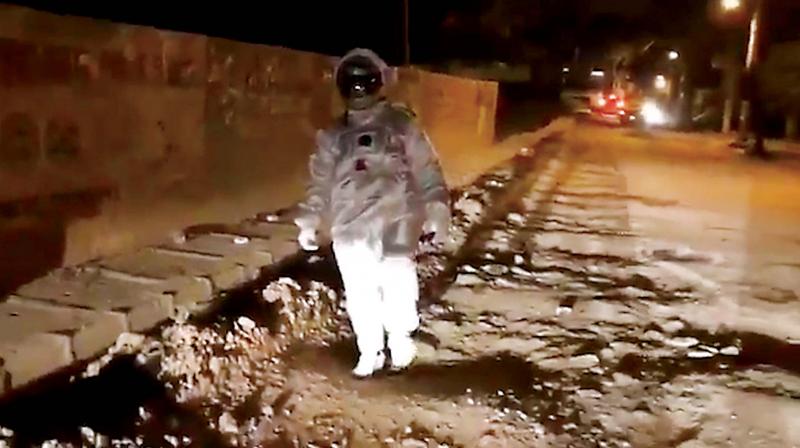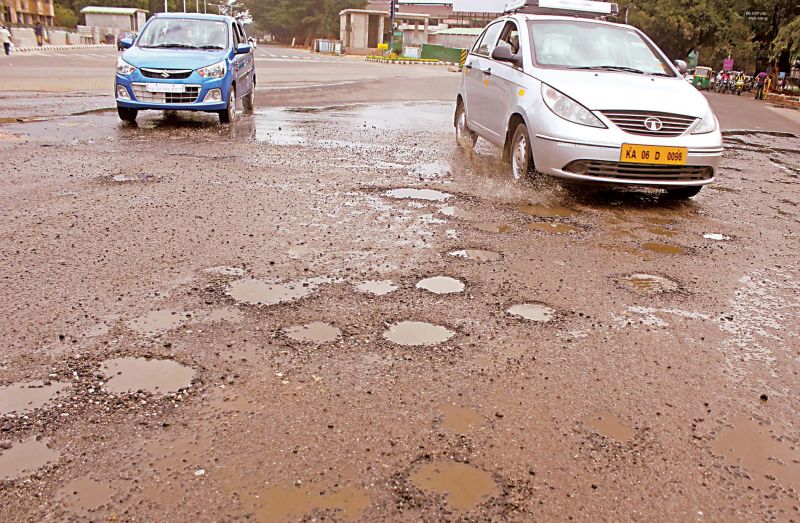The \'hole\' truth: Why does it take a VVIP visit for BBMP to fix Bengaluru?

The Prime Minister’s arrival caused a magical sprucing up of the city, with potholes being filled and garbage cleaned overnight in preparation for the visit.
When news of the visit first appeared, I thought quick action was likely ... perhaps there is a special wing to cater to VIP visits? I realised soon enough, that there is no VIP wing of the sort, that the job is being done by the BBMP and the regular municipal workers. Why the turnaround? Why does the very same municipal corporation show such promptness when a VIP is involved?
The next question to ask is, who is a VIP? Those who hold constitutional positions, like the Prime Minister, President and even the Chief Ministers fall into this category, yes. But why are they treated differently from ordinary citizens in terms of municipal action, like clearing potholes and cleaning the roads? The question we need to ask ourselves is why this is acceptable.

India became a Republic on January 26, 1950. Our Constitution says we are a democracy, where all men and women are equal. So, when public works are being undertaken, shouldn’t all people be treated the same regardless of religion, region, caste, position or economic status? Of course, this is not the case in reality. We need to ask ourselves why that is and how we let it happen. The state of affairs is more akin to a monarchy, with the VIPs being treated as royalty, where processes come to a halt so that authorities can cater solely to them. In the end, they are so special they don’t see the realities of the life the rest of us live. They have been elected by the people, to represent us. In my humble opinion, they don’t deserve special treatment. I don’t wish for this ‘special treatment’ to stop, I just wish the BBMP would treat all of us, the 1.3 crore people who live in Bengaluru, just the same. There is no reason why they shouldn’t.
Perhaps you think now that this has stopped making sense: How can everyone be treated like a VIP? The bottom line is that the BBMP should behave the same with both VIPs and ordinary citizens. The Palike, is, after all, paid to deliver civic amenities to the city’s population as a whole and as we all know, they are unable to do so.
Let’s look at the issue from their point of view. The BBMP is understaffed as far as I can tell and there are nearly a 100 vacancies for civic engineers across the city. The same officials work on multiple wards, dealing with a multitude of issues. When citizens contribute to the pool of taxes the money allocated back to Bengaluru is simply not in proportion to the taxes we pay. There is devolution of funds that divides tax money coming into the state from the Centre with all the urban and rural bodies of the state of Karnataka.
What we need is a functional Finance Commission, one that works actively with the views of different urban local bodies to understand the functions of the city municipal corporations and come up with a formula acceptable to all. If VIP treatment is needed, the first thing that we should demand is the empowerment of local bodies and this empowerment begins with more funds and functions.
In this country, our expectations of leadership are pinned entirely on the PM and the Chief Minister. We rarely do consider those who govern us locally. But these are the people who actually make a difference in our day-to-day lives, they are responsible for maintaining the roads, parks, garbage, water and all the factors that make life better or worse in a city. Electorally, we are lackadaisical about municipal elections, with little participation and very low voter turnout. The voting percentage of the Bengaluru civic body is far less than that of assembly or parliament elections.
A few months ago, the city came together to oppose the steel flyover, which felt like a VIP flyover, meant to take people from the city to the airport. 8000 people stood in a human chain with cries of “Beda, we don’t want this! We demand better integrated sustainable public transport.” Similarly, we also demand empowered local bodies, ward committees to be accountable, more powerful and granted a real budget. Thanks to the efforts of citizen groups, Bengaluru has working ward committee meetings. The High Court of Karnataka has also asked the committees to be more active about evaluating issues like potholes and to deliver monthly reports.
Citizens really have power via ward committees and it helps create the feeling that ordinary people need not be different from VIPs. We need to look at active participation in ward committee meetings, so officials are pressurised to deliver.
—The writer is co-founder of Citizens for Bengaluru

